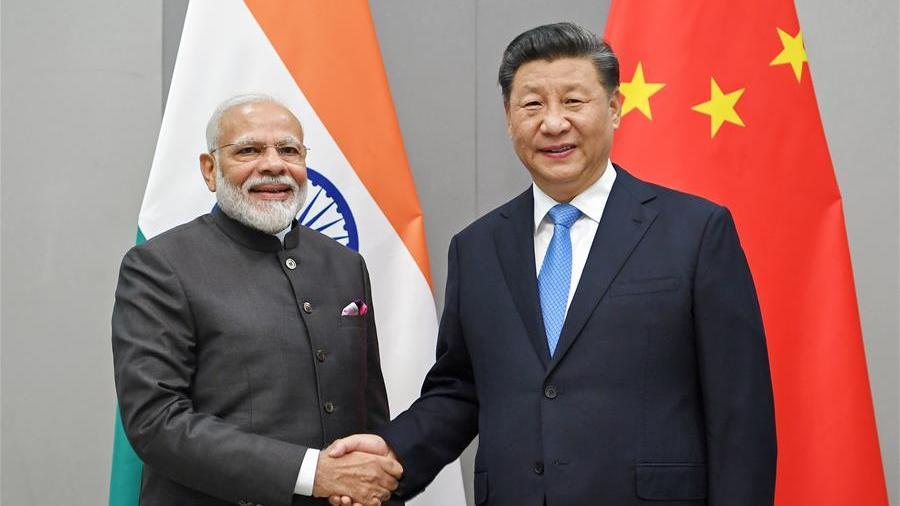Roadmap for stronger China-India ties
By Andrew Korybko | CGTN | Updated: 2019-11-17 11:15

Chinese President Xi Jinping and Indian Prime Minister Narendra Modi met on the sidelines of the latest BRICS Summit in Brasilia and agreed that the High-Level Mechanism on Trade and Economy, that they decided to establish after last month's "Chennai Connect," should meet at an early date. This is a very encouraging sign which suggests that there is a political will on both sides to strengthen partnership following recent economic and geopolitical disagreements.
India surprised many observers earlier this month when it refused to join the Regional Comprehensive Economic Partnership (RCEP) that was supposed to have been finalized in Bangkok during the ASEAN Summit. Its primary reason for opting out of the mega-bloc was its concerns that entering into a free trade deal with China might end up being detrimental to its economy by widening the trade deficit between them. This explanation eerily resembled the rhetoric presently espoused by U.S. President Donald Trump.
New Delhi's decision was followed up shortly by the Indian government delaying the issuance of visas to Chinese delegation members supposed to travel for the India-China business forum, which had to be called off because of it. This led to worries that their territorial disputes over Kashmir - India's de-facto annexation of the territory - and publication of new provocative map, and South Tibet are spreading to the economic sphere.
Altogether, it seemed as though India was on the path to pivoting toward the U.S. "Indo-Pacific" strategy of "containing" China, which would be disastrous for the emerging Multipolar World Order if that worst-case scenario comes to pass. There was a collective sigh of relief, then, after the Chinese and Indian leaders met during the BRICS Summit and agreed to prioritize the High-Level Mechanism on Trade and Economy, which could ultimately serve as the roadmap for a stronger China-India partnership if successful.
Although the two states have well-known geopolitical and trade disagreements, they're united in their vision of reforming the global financial system in order to make it fairer for developing countries such as themselves, which is one of the key purposes of BRICS to begin with. This common understanding explains their joint desire to improve their trade ties as well, seeing how their global financial reform efforts won't amount to much if India doubles down on its current economic stance and possibly "pulls a Trump" by triggering a trade war.
India's Commerce and Industry Minister Piyush Goyal said that his country was reviewing the terms of its free trade agreement with South Korea and would soon begin the same process with Japan as well. Indian External Affairs Minister S. Jaishankar recently said that "the purposeful pursuit of national interests is shifting global dynamics," so there's a credible reason to wonder what India's long-term strategic intentions really are, especially in the economic sphere.
Therefore, it's a welcome sign that Prime Minister Modi agreed with President Xi that their countries' High-Level Mechanism on Trade and Economy should meet as soon as possible since it'll give their finance ministers an opportunity to speak frankly with one another about India's trade deficit with China. In the best-case scenario, a pragmatic bilateral trade solution might emerge from this mechanism which could then potentially lead to India reconsidering its rejection of RCEP and joining it instead.
Whatever happens next, it's important not to lose sight of the fact that China and India have a common understanding on the need to gradually reform the global financial system, which in turn necessitates stable trade relations between them and the avoidance of a trade war at all costs. Once their economic disagreements with one another are settled, these two rising powers can then build upon the trust that was generated through that resolution and finally begin tackling their geopolitical problems with confidence.
Andrew Korybko is a Moscow-based American political analyst.
























